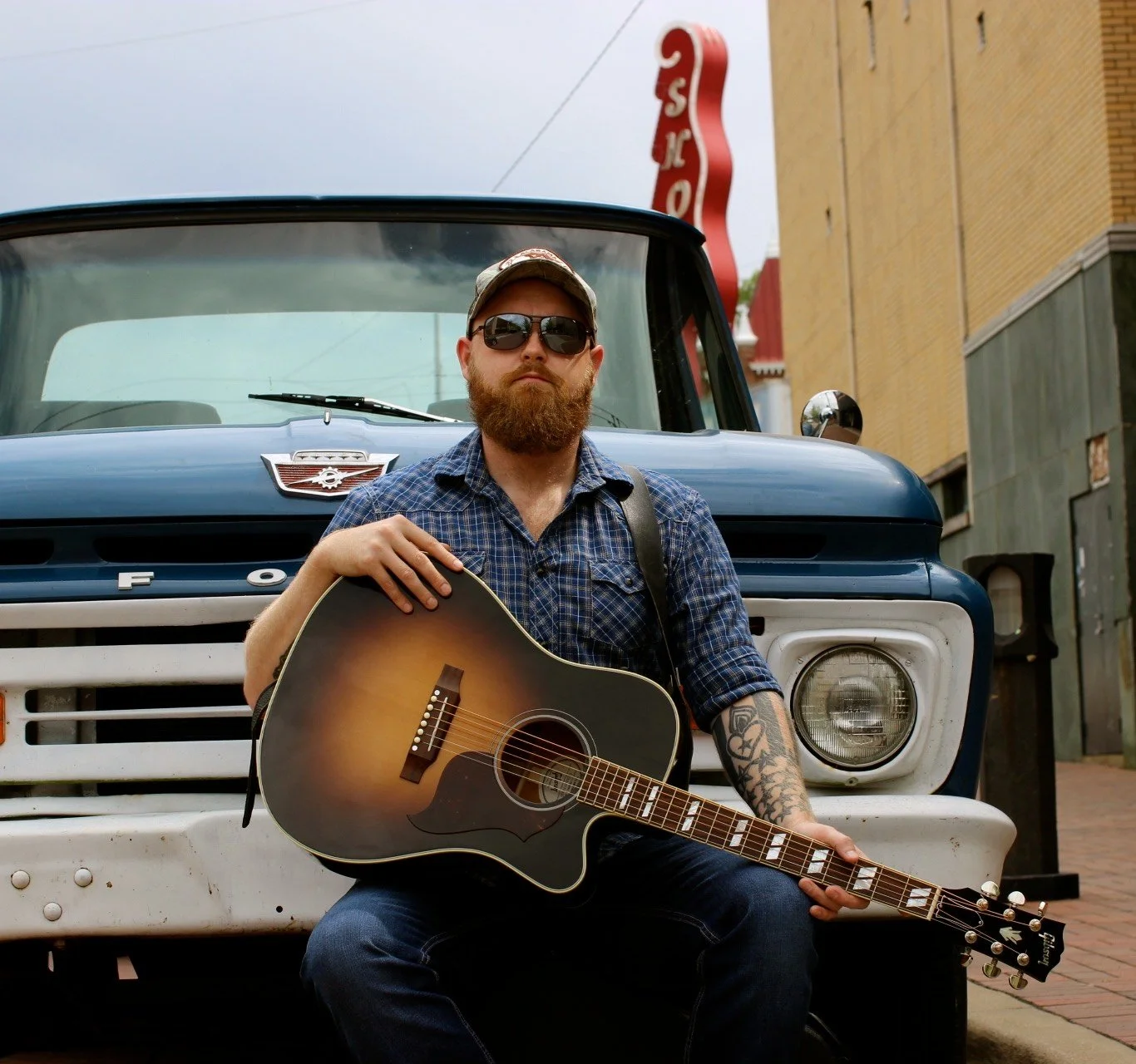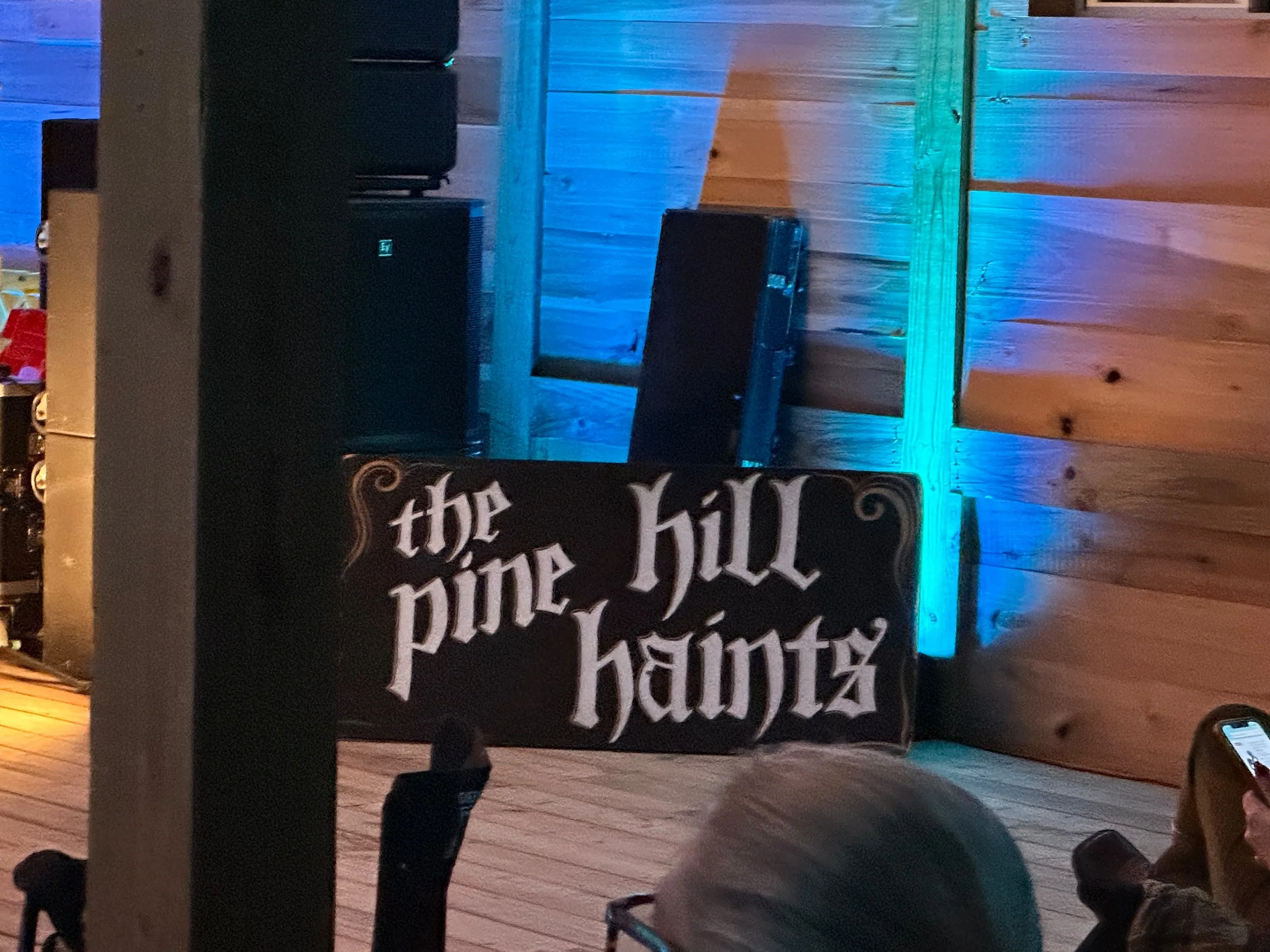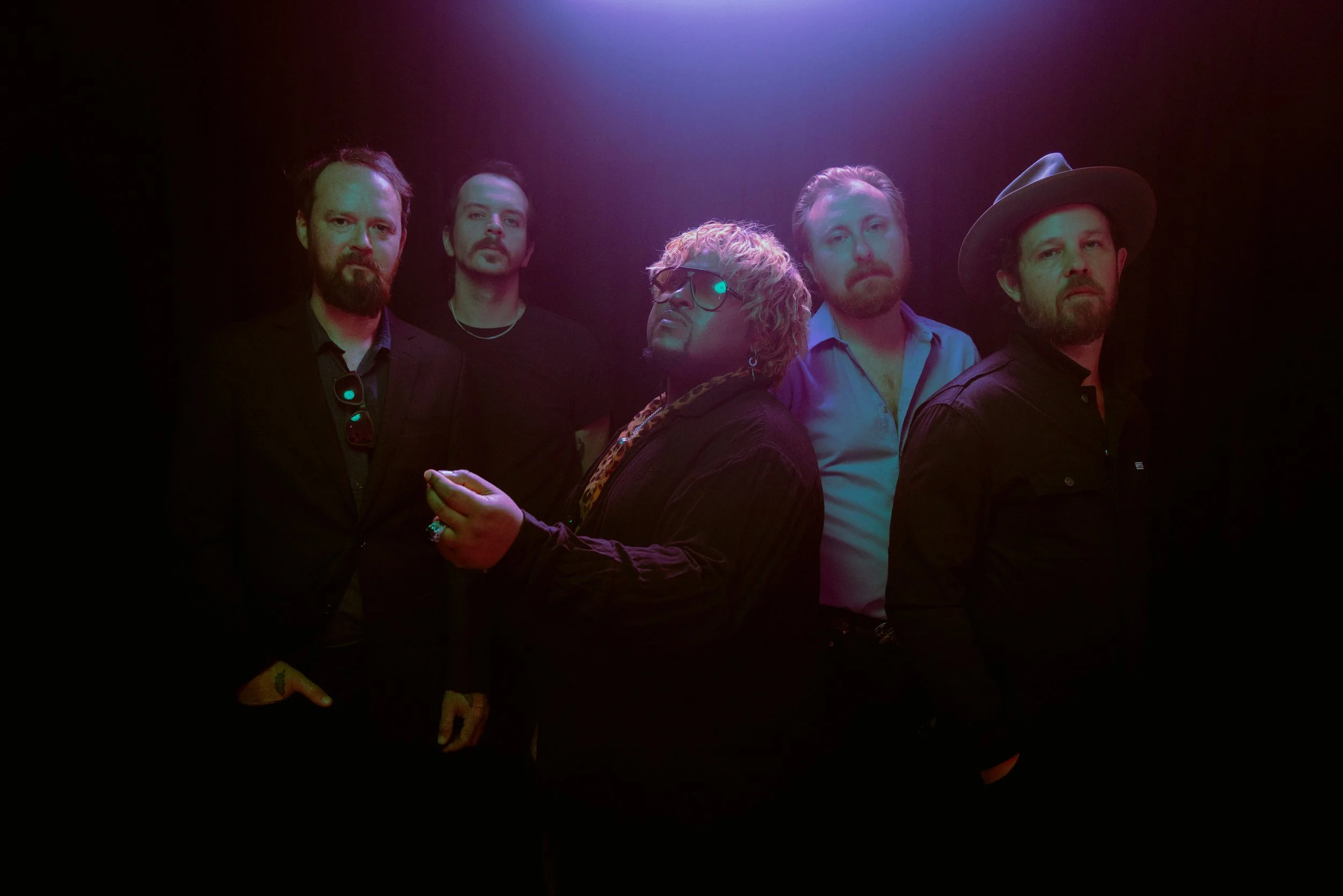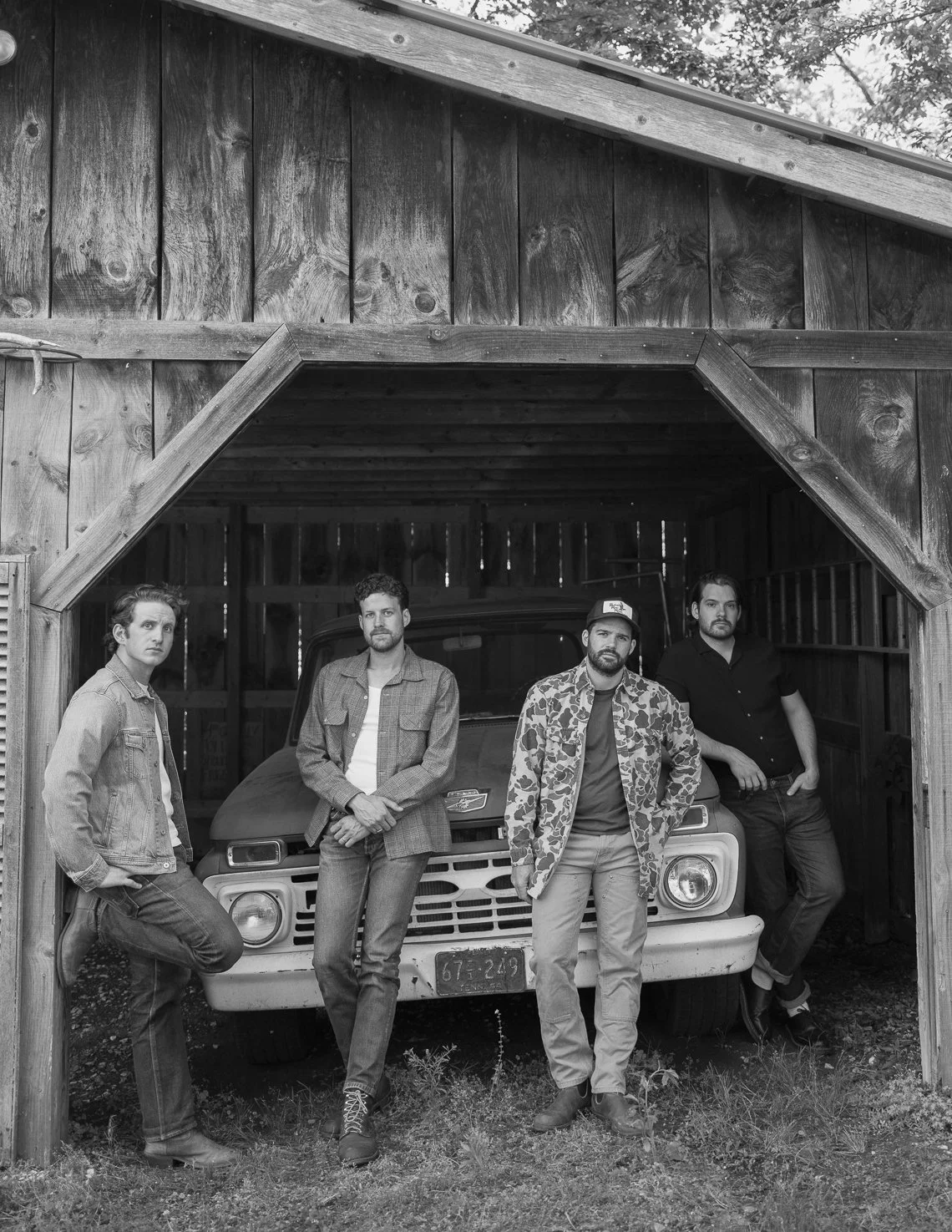The Party Starts Here
Our music is as much a part of Hog Creek as the food and fellowship. Explore the sounds of the Cotillion on Spotify and bring a little Hog Creek home with you.
-

Fri 11/7 @ 7 PM JOELTON MAYFIELD
Joelton Mayfield
Crowd Pleaser
By the winter of 2021, Joelton Mayfield had done nearly a decade of work to prepare his debut LP, Crowd Pleaser. As a teenager, he’d toiled for years as the music director of his Texas church, despite extreme doubts about Christianity’s role in his life and his role in Christian life. He’d then shipped off to Nashville, hoping to earn a music business degree in the city where they seem to be factory-made. He’d instead switched to English, studied the more mature songwriters around him, joined a series of college bands, and drifted into the edges of the city’s indie rock and alt-country enclaves, building a patchwork of players he trusted.
And that February, he’d driven two trailers and several carloads of gear to a farm near Alabama’s Mobile Bay, turning the family barn of a bandmate friend into an ad hoc studio. He’d trucked a Hammond organ from Nashville and his grandmother’s century-old vibraphone from Texas, even buying a stack of area rugs to absorb the sound bouncing from the barn’s concrete floors. And then, just days before Mayfield was set to make his first full-length testimonial, the love of his young life—and the person set to co-produce the album, no less—dumped him.
The three weeks that followed were among the best and worst times of his life. Mayfield substituted a pack of cigarettes a day and too much booze for sleep, teetering on the edge of a breakdown. He was moody, distraught, and distracted, caught in a nightmare. But this was also his dream, being surrounded by musical friends from Texas and Nashville in a barn-turned-studio that was more practical and interesting than he could have imagined, singing songs about trauma and hypocrisy and pain and disappointment that had, in a very real way, already saved his life.
So Mayfield and a band that sometimes numbered nearly a dozen rendered these 10 songs with radical urgency, the bummer feelings that had first led to them reanimated by sudden rejection. Mayfield clung to his own words, like a life preserver or guardrail or any piece of art that simply reminds someone that this world can always change for worse but especially better. Indebted to traditions of incisive Southern storytellers and country-rock bands interested in upending their forms, Crowd Pleaser squares up to the difficulties and betrayals of Mayfield’s first quarter-century and makes the absolute most of them—10 compelling affirmations for the rest of us.
Raised outside of a small central Texas city, surrounded by open farm fields and dirt roads, Mayfield was a “miracle baby,” the child his parents never truly expected after decades of trying. His family was religious and musical, two disciplines forever intertwined in their lives, both at home and at their Pentecostal church. As a kid, Mayfield won awards in the Royal Rangers, a conservative Boy Scouts alternative, for his ability to recite Bible verses; as a teenager, he began leading Wednesday night worship services for people much older than him and eventually even
helming the church’s music ministry. Outside of oil-slick Contemporary Christian Music, he heard only some classic country, scant Texas blues, and the Gaithers, a family institution that was in turn a family favorite. There was no household internet, and television was censored by a draconian device called TV Guardian.
Fissures slowly grew between Mayfield and the church, Mayfield and family. He heard the words about treating people kindly but then saw how others who were not straight and white were handled by the so-called faithful. He felt exploited, too, his interest in and predisposition for music used as (largely) unpaid labor. These feelings coincided with his late discovery of songs beyond his faith. Dylan’s “Knockin’ on Heaven’s Door” exploded his idea of what a tune could accomplish, as did a web of relatively outsider songwriters—Sufjan Stevens, David Bazan, Jeff Tweedy. He began writing for himself, not only slowly finding his voice but a map of what he believed and rejected. He fled Texas for Tennessee, intuitively knowing there was more to discover than his hometown cloister of culture.
Crowd Pleaser documents the widening chasm between Mayfield, the sheltered Texas kid, and Mayfield, the burgeoning songwriter indulging in all the music, movies, relationships, books and conversations that came with leaving his sheltered early life. His sense of the bigotry, misogyny, and myopia he’d left behind sharpened, too. These songs are a map of an unraveling and the concomitant reformation, as he sorts through hypocrisies, doubts, and disappointments and does his best to make sense of them. Throughout Crowd Pleaser, Mayfield returns to the line “God’s children never grow up.” It’s as if he’s finally admitting not only that he was cast out of the garden long ago but also that there may never have been a garden at all, that you have to move along to find out.
Penned in three sections, the pulsing “Speechwriter” wades through the lies we slowly learn we’ve been living with, from the way the government (no matter who has held power during the last 250 years) fronts about holding your best interests in its candid little capitalist heart to the promise of privilege that can still leave one rotten to the core. “How can I convince you anything I’ve ever felt is worth grieving?” he asks in one stinging line. That same unease permeates “The Shore,” where everything we think we know and love seems only like a cover for a collapse that will happen any minute. “Is this the future we always dreamed of?” Mayfield sings, his voice and the band behind him so calm and cool that they seem to be teasing us for the devastation we have yet to detect.
The woes, mind you, aren’t all so existential. If you hear some familiar lines in “Turpentine (You Know the One),” yes, Mayfield borrowed bits from Wilco and the Mountain Goats on one of the oldest songs included here, meant to illuminate both the perpetual failures of the music industry but also the miraculous way people keep making and sharing songs, anyway, because they remain so very powerful and potentially resonant. Wilco’s Late Greats failed, as did the
Mountain Goats’ Best Ever Death Metal Band Out of Denton. Instead, in Mayfield’s vision, we get stuck with the bullshit band on Spirit 105.9 that is “everything you hate about everything you wish you liked.” And still, we create. Cruelty comes in many forms, including rock radio.
Many of Crowd Pleaser’s songs scan as steadfast alt-country, Mayfield digging into a bedrock of so-called Americana like a strata of sediment simply waiting to be discovered. As important, though, are the vivid signs here that he is part of a Gen Z cadre for whom Wilco’s Yankee Hotel Foxtrot and A Ghost Is Born, Pavement’s Slanted and Enchanted, and Neil Young’s Harvest are part of the same firmament, not aberrations in its architecture.
You can hear it immediately in opener “Red Beam,” an apocalyptic vision of every new morning where the growing sound swallows you like a blazing Southern sunrise. Cut by noise and samples and built with a nonlinear structure that allows Mayfield to wrestle with the biggest questions of our existence without pretending to have tidy conclusions, it is a theme song for stumbling into the unknown, blinking hard, and moving forward, anyway. You can hear it in “Blame,” too, a chronicle of being let down and left out, even when one’s desires are as simple as “a highway exit/a checkout before 11.” Sheets of drone radiate beneath the electric surges of the chorus, while bits of dissonant strings circle the verses like the thoughts of a brain addled by its own overdrive. And what of the rumbles beneath and glows around “Jacob Dreamed a Staircase,” a beautiful hymn about being deserted by faith, where the sounds sigh and moan and growl like heavenly taunts? Crowd Pleaser is only the first full statement from a singer-songwriter invested in the future of his chosen field.
In 2024, a year before Crowd Pleaser was even ready for release, Mayfield opened several shows for two heroes—John Darnielle, of the aforementioned Mountain Goats, and John Moreland. Both have used songwriting to stare into personal voids, to stand at the edge of some never-ending abyss and tell the truth about what they’ve seen down there. Mayfield is a new member of that tradition, having put some of the most difficult lessons he’s learned in life to paper and then gathering his friends to help animate them, to turn them into these songs meant to be shared like communion. “God’s children never grow up,” goes that refrain. Yes, some of them just grow into something unexpected: songwriters able to relay the good news that can exist in passing through the hardest of times and emerging on another side, able to sing about it.
-

Fri 11/7 @ 8 PM Shovels and Rope
SOMETHING IS WORKING UP ABOVE MY HEAD
One night in the middle of the night there were a series of noises coming from above which lead to a series of thoughts. It sounded like something was working. Building something… A nest for its family? A trap for its prey? This led to more thoughts about unseen things at work. A God? A voice in your head? It all feels kind of made up until someone responds to it.
Less means more. That’s kind of always how it’s been with us. This time the rules were simple: we can only use what we work with live and whatever we put down on tape must be accomplishable on a stage in a live setting. That’s always seemed to be when we’re at our best. Or most twitchy. Many times we’ve made records that we loved and then, after figuring out how we’d perform it live, we end up falling in love with the live arrangement because being a 2 piece band, it took some real risk and struggle which led to innovation, which gave it a whole new life. (Consider the tortured grape.) So with this one we just started there and worked backwards. The result encapsulates, more than anything we’ve done before, the sound of our live performance. Resulting in what one might consider by definition, a definitive album.
The summer and fall leading up to recording we spent writing songs, hanging out with family in Colorado, and playing shows opening for The Wood Brothers and Gregory Alan Isakov, both of whom have large audiences. So each night we were playing in front of a lot of people, many of whom had never heard of us. We decided to take those opportunities to rattle our comfort zone cage and try out a bunch of brand new, just written songs and basically learn how to play them in front a few thousand people. The songs would grow and change show to show, sometimes for the better and sometimes for the worse. Maybe we go down in flames? Maybe something beautiful happens while it’s burning? We happily embraced the chaos. That’s kind of always how it’s been with us.
We had a new song that initially neither of us thought that much of called ‘Love Song From A Dog.” During one of the first nights of the Isakov run, we decided on stage, mid set, to try it out because the show was going well and the audience was warm. And it kind of killed. People honestly wouldn’t shut up about it. Not a brag more like a phenomenon or a weird dream. It became a fan favorite moment of our set each night and honestly in all the years of doing this we’ve never had so many people send us messages or reach out about any one specific song as they did this one. It just goes to show us that we don’t know anything. When it came time to record it we thought it’d be fitting and a nice touch to have Greg sing on it since it was his audience who basically fostered it into being by giving us the confidence and encouragement we needed to see it the way they did. He generously obliged and the song was instantly elevated by the sincerity and richness of mood that colors his voice.
The two of us can’t help but be obsessed with duality. The song ‘Two Wolves’ is a meditation about two conflicting energies competing for power. The first time we ever played it was on New Years Eve in an arena opening for Tyler Childers in front of 15k or so country music fans who surely were like “what the hell is this,” but to us it seemed 100 percent appropriate because it just feels like an arena type song. A fuzzy, thick riffed stomper with a meditative head bob refrain. So we opened with it because, well.. it felt like we had to.
For those who are new here we’ve spent the last decade or so bouncing around in the ‘Americana’ realm quite a bit. Getting branded into that world was admittedly a bit of a head scratcher for us as we’ve always identified as more of a rock band (though we do think of ourselves as folk songwriters and yarn spinners, and we do harmonize well together) but the people were paying attention and we were building a fan base so we kind of felt like “who were we to tell them who we weren’t?” But when you go all the way to Europe and are standing on a stage in front of a few hundred Scandinavians who are dressed in head to toe denim and cowboy hats, we can’t help but feel like we’re about to confuse some people. We will often find ourselves playing an outdoor, ‘free in the park’ type of concert series where a Male and Female with 2 guitars and beautiful harmonies will be booked as the opener, and then we’ll take the stage and proceed to be a little louder and maybe a little more brash than was anticipated. It’s always kind of been this way with us. The joke in our camp when this happens goes something like: And for tonight’s entertainment, we have for you “The What We Thought They Were’s” followed by the “Louder Than We Thoughts”! Recently we did a gig where the spokesperson said to us just before we went on, ‘so maybe don’t come out with your heaviest guitar stuff and your 808 bass bullshit right off the rip…there are kids and old people here and they’ll leave” (he was trying to be helpful). We politely told him “Don’t worry, we have a plan”.. .and then again opened with ‘Two Wolves,’ with it’s loud guitar stuff and it’s 808 bullshit, followed by a dynamic set where we touched on all the different things we do and everyone proceeded to have a great time. That’s kind of always how it’s been with us.
“Something Is Working Up Above My Head” is a catalog of vulnerable characters with sweet and sordid narratives.
‘Colorado River’ is a song about a boy and his Dad disposing of bodies in various ways as the water level recedes and dark surprises surface. The hot dog bun line was initially supposed to be a place holder because it sounded funny and it rhymed, but then we sang it so many times over the summer that it built a little hot dog shack and moved in forever. I still think it’s kind of dumb but it’s also kind of great. For those who pay attention, it's a pretty obvious John Prine nod. I’d like to think he handed us the hot dog bun like a relay baton on his way to the great mystery. Macabre pairs well with a side of humor.
‘Piranhanana’ is about a boy growing up in a house of sex workers and being fine with it with a little meditation, while his sister struggles to find her zen. ‘I’d Be Lying’ is about navigating a crisis with a long time friend. ‘Double Lines’ follows the journey of a young woman thru pregnancy tests, covid tests, and various other forms of duality and two-ness.
‘Something is Working’ and ‘Dass Hymn’ (referring to Ram Dass) were the last 2 songs written and added to the collection of songs. They book end the record with questions about what, if anything, is pulling the strings? In the closing moments of the last song, 3 generations of our family all sing together about how nobody knows what happens at the end. And in all the not knowing, it’s comforting to sing with your family.
-

Sat 11/8 @ 5 PM Doc Dailey & Magnolia Devil
Doc Dailey is a singer-songwriter whose music moves between Americana, folk-rock, alt-country, and Southern pop. Based in the Muscle Shoals area, he has spent over two decades honing a distinctive voice rooted in soulful storytelling and a sound that feels both timeless and immediate. A fixture of north Alabama’s rich music scene, Dailey has toured nationally, sharing his songs with audiences across the country. Through his independent label, Southern Discipline, Dailey has released an EP and two full-length albums, earning praise for balancing intimate, finely crafted songs with wide-open, electrified arrangements. He often performs solo but is sometimes joined by his band, Magnolia Devil, adding even greater depth to his live shows. His catalog is available on all major streaming platforms, but it’s on stage where his music fully comes alive — raw, dynamic, and steeped in the spirit of Southern music.
-

Sat 11/8 @ 6 PM Pine Hill Haints
Description goes here -

Sat 11/8 @ 7 PM Billy Allen and the Pollies
There is a ferocious Southern engine inside of Billy Allen + The Pollies’ debut album Black Noise. It thrums to life atop a classic rock chassis and expertly weaves in and out of gospel, grunge, funk and soul along its eleven-song journey. From the explosive top of the album (a liberating anthem of self-worth called “All of Me”) to the spiritually haunting final track (the wurlitzer fueled “Go on Without Them”) Black Noise is a genre-defiant haymaker that lands.
The band is a hybrid of four piece rock outfit The Pollies and fellow Alabamian, and frontman, Billy Allen. The story of what fused Allen and The Pollies is one that begins in a bar 8 years ago. This particular bar was on Allen’s gig circuit and it just so happens to be where Jay Burgess (founder of The Pollies) was having a drink that evening. While there was intrigue and potential in that first chance meeting, the two would remain ships in the night, each building their own careers, until years later when the stars would align at FAME studios in Muscle Shoals. As the story goes, both Allen and The Pollies, who were all occasional session musicians at Fame, were finally in the room together and the track on deck was Little Richard’s “Greenwood, MS”. To hear Allen retell this part of the story is to hear a man talk about the beginnings of a priceless friendship. “There was an immediate romantic musical connection,” Allen said. “This is my band.” To hear Burgess tell it, the feeling was mutual. Over the subsequent year, the two groups rehearsed, toured, wrote, and gelled together under the moniker Billy Allen + The Pollies. The joining of Billy and Jay (along with the other charter members of The Pollies: Spencer Duncan, Jon Davis & Clint Chandler) was like the clicking of a dislocated bone back into true.
Named after a theoretical sound bomb with the power to destroy whole cities, Black Noise was written almost entirely during the pandemic, beginning as voice memos between Burgess and Allen. With the lockdown in full swing, the musicians became each other’s micro-community, and voice memos progressed to writing sessions in Jay’s garage, and continued to full band rehearsals at Jay’s Greenhill, Alabama, sanctuary Studio 144. When the time to cut the record arrived, they tapped long-time friend and Grammy winning musician Ben Tanner to produce and engineer. Tanner (co-owner of SingleLock Records and former Alabama Shakes keys player) brought the band to Sun Drop Sound in Florence where the bulk of the recording was done. The band was so deeply meshed that the album they captured between April and November of 2021, other than a small overdub section, was recorded fully live, without a click, and 3 takes or less per song.
Listening to Black Noise feels like walking on the alien terrain of a new genre. It sounds like garage grunge by way of Jackie Wilson. The very same kerchief Billy Allen uses to wipe sweat from his brow on stage could be carrying DNA from Wilson Pickett, Joe Cocker, D’Angelo, Ziggy Stardust, or any of the Spiders from Mars. Theirs is a gritty and trailblazing sound. They are a band full of smiling time travelers, able to visit and draw from a multitude of eras and styles. Black Noise is an album that devastates you to the point of remembering why you love music. This is the type of band you root for. You can’t help it. They’re that damn good.
-

Sat 11/8 @ 8 PM Breakfield
The Nashville-raised four-piece is a fusion of Americana & folk-rock with a foundation of bluegrass, telling their stories through an honest & roots-driven perspective. The band, which has been together in some iteration since members were in high school, includes Barton Davies (banjo/vocals), Ford Garrard (bass/standing bass), Sam McCullough (drums) and William Reames (acoustic guitar/harmonica/vocals).